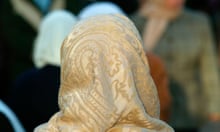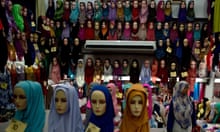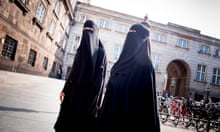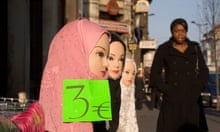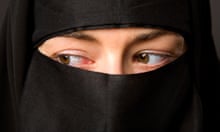The movement to limit women wearing headscarves and Muslim veils, such as the burqa and niqab, has been growing in Europe for more than a decade. Now the European court of justice, the EU’s highest court, has ruled that employers can ban staff from wearing headscarves, its first decision on the issue of employees wearing visible religious symbols at work.
Here is a timeline of the legislation passed:
24 September 2003
Germany’s federal constitutional court rules in favour of an Afghan-born teacher who wants to wear an Islamic scarf to school. But it says states can change their laws locally if they want to. Half of Germany’s regions go on to ban teachers from wearing headscarves.
3 February 2004
France’s national assembly begins debating a bill to ban religious symbols, including Muslim headscarves, Jewish skullcaps and large Christian crosses, from schools.
31 March 2010
A key committee in Belgium votes to implement the first European ban against wearing the burqa and niqab in public. “I am proud that Belgium would be the first country in Europe which dares to legislate on this sensitive matter,” says the centre-right MP Denis Ducarme. But it is the French government that imposes the first ban. A law banning the full-face veil does not come into effect in Belgium until July 2011, three months after the French ban.
11 April 2011
Under a decree by the French prime minister, François Fillon, women are banned from wearing the niqab in any public place. Under the first ban of its kind in Europe, face veils are outlawed virtually anywhere outside women’s homes, except when worshipping in a religious place or travelling as a passenger in a car.
1 July 2014
The European court of human rights upholds France’s burqa ban. The judges say preservation of a certain idea of “living together” is the “legitimate aim” of the French authorities.
22 May 2015
The Dutch cabinet approves a partial ban on face-covering Islamic veils on public transport and in public areas. The ban does not apply to wearing the burqa or the niqab on the street, except when there are specific security reasons.
18 January 2016
The former UK prime minister David Cameron says he will back institutions with “sensible rules” over Muslims wearing full-face veils, but rules out a full public ban.
“In our country people should be free to wear what they like,” Cameron says, but adds:
When you are coming into contact either with different institutions or, for instance, you are in court, or you need to see someone’s face at the border, then I would always back the authorities or the institutions that have put in place proper and sensible rules.
18 August 2016
France’s prime minister, Manuel Valls, defends municipal bans on body covering burkini swimwear designed for Muslim women after mayors impose burkini bans in several seaside towns including Cannes, Villeneuve-Loubet, and Sisc on the island of Corsica.
6 December 2016
The German chancellor, Angela Merkel, endorses a partial ban on the burqa and the niqab. “The full facial veil is inappropriate and should be banned wherever it is legally possible,” she says.
30 January 2017
Austria’s ruling coalition agrees to prohibit full-face veils such as the burqa and niqab in courts and schools. It also pledges to investigate banning headscarves for women employed in public services, in a move designed to hold the ruling coalition together by placating the anti-immigration Freedom party.
14 March 2017
In its first decision on the headscarf issue the European court of justice rules that employers can bar staff from wearing visible religious symbols. But the court also rules that customers cannot simply demand that workers remove headscarves if the company has no policy barring religious symbols.
31 May 2018
The Danish parliament votes to ban garments that cover the face, including Islamic veils such as the niqab or burqa. The bill was presented by the ruling centre-right coalition.


